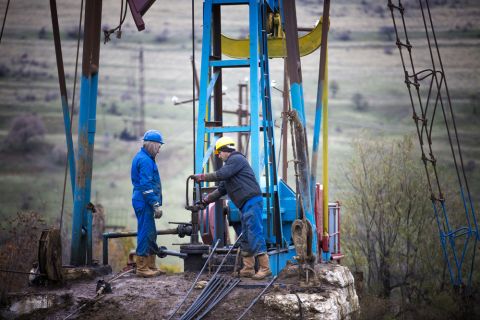Back in 1994 when Steven Seagal was still considered a bankable movie star, he released an action adventure film panned by critics and audience alike – On Deadly Ground. Filmed throughout Alaska, Washington state, and an oil refinery in California, it is perhaps best remembered for tapping that age-old stereotype, the “Ruthless Oil Company,” as the seminal and unforgivable Bad Guy. Low brow moviegoers – what few there were – were quick to cheer Seagal’s “mystical martial artist - environmental agent” against the villainous executives, as hardily as they would against any Bond villain or mustache-twirling rogue of the silent era.
Sixteen years later, pop culture aficionados and public relations staff are still wondering – when did Big Oil get to be the Bad Guy? And more importantly, when do we get to be the Good Guys?
Through seventies disaster movies like The China Syndrome, eighties action movies, numerous spy novels from the likes of Clive Cussler and James Michener, and the daily consumer pain of actually paying for fuel, the average American hates Big Oil. Like a hell-bent shark or a futuristic cyborg, the image of the well-dressed and ruthless industry executive is iconic and exploitable. The stereotype of Evil Oil Company has become so ingrained in the lexicon of popular dialogue, that recent cinematic efforts like There Will be Blood and Quantum of Solace can use the imagery of an all-powerful petroleum menace to disguise the true threat in the plot. In movies and pop novels, at least, to embrace Big Oil is to support an Evil Empire.
There have been aberrations in Hollywood of course. The Raiders of the Lost Ark movies reintroduced the Nazi as wholly evil Bad Guy, and terrorists (local and foreign) have been popular baddies for years. The idea that the head of a large corporation and his minions have gained their place by treachery, deceit, and disregard for humanity has been around since the time of the robber barons. Lately, the Vatican and Big Religion have been presented - and accepted - by audiences as mysterious and powerful and fearful by the DaVinci Code books and movies.
And thanks to the efforts of Lehman Brothers, Citibank, and the mass media, Big Finance has taken a turn in the stockade as the Bad Guy; often deservedly so. Whatever people may think of Bernie Madoff, the fact that he was exposed getting rich on the fraud of his clients certainly makes others in his tax-bracket suspect of skullduggery.
So why hasn’t the average American’s dislike of Big Business drifted from Big Oil to Wall Street and Zurich and Dubai as of late?
The easy answer can be summed up in two words – British Petroleum. Whatever good will the petroleum industry built up the last 30 years was swept away by one errant well in the GoM. The media and the public were quick to dredge the Big Oil Bogeyman out of the closet of popular opinion, and beat it in effigy (justifiably in the southern US and less so at your local gas station). It didn’t help that BP was already perceived as a stoic and impenetrable organization – this is not Apple or Pepperidge Farms! – and it’s PR efforts crumbled at the feet of a seemingly disinterested and unrepentant CEO.
Obviously there is enough guilt to go around to fit an errant Exxon tanker; continuous disregard of environmental and regulatory concerns by large corporations pursing profits – or simply being careless or ignorant of The Environment – have keep the pump primed. The reality that consuming our product can release toxins into the atmosphere is hard to spin; just ask the PR firms working for Big Tobacco. We are not blameless here.
But deeper than the distrust of large corporations, the fear of nuclear meltdown, and the envy of the rich and powerful, there is a whole-hearted lack of affection for the organizations and people that provide electricity and fuel. Has anyone in the 20th century spontaneously and dispassionately displayed their warm sentiments to the industry that provides the basic tenets of power to their lives? Is there no-one on the Eastern seaboard hugging their radiator in January, as a hybrid-driving twenty-something cradles their beloved IPhone? Are only employees of Royal Dutch Shell wearing their emblazoned shirts, or waving bendy-straws at their friends as a knowing gesture in support of cleaner exploration?
There are more than 9 million staff supporting the petroleum and utility industries, and – tops – 10,000 neo-Nazi militia in North America – doesn’t that make them the more likely extremists bent on the wanton destruction of the American way? Shouldn’t Hollywood strive to identify the greedy and inhumane outside of Big Business for all the evil deeds perpetrated in pop culture, if only for historical accuracy? Can’t someone walk up to the gleaming towers in Texas or Holland or Alberta and hug a weary oil executive on his or her way home from work, grateful that they and their family are able to survive another harsh winter thanks to the discovery, refining, and delivery of petroleum products …?
… okay, maybe that last one was asking too much.
Recommended Reading
OFS Sector Loses Jobs, but Trade Org Says Growth Potential Remains
2024-05-08 - According to analysis by the Energy Workforce & Technology Council, the OFS job market may still have potential for growth despite a slight decrease in the sector in April.
Dividends Declared in the Week of May 6
2024-05-10 - Here is a selection of upstream, midstream and service and supply companies’ dividends declared in the past week.
Berntsen Joins Xcel as Executive VP, Chief Legal and Compliance Officer
2024-05-22 - Rob Berntsen is assuming the role from Amanda Rome, who had been in the position on an interim basis.
Riley Permian Increases Stake in West Texas Power JV with Conduit
2024-05-22 - Riley Exploration Permian increased its ownership in RPC Power, a JV with Conduit Power, to 50% from 35% and has agreed to sell up to 10 MMcf/d of natural gas as feedstock supply for the generation facilities as RPC plans to sell to ERCOT.
Upstream, Midstream Dividends Declared in the Week of July 8, 2024
2024-07-11 - Here is a selection of upstream and midstream dividends declared in the week of July 8.





